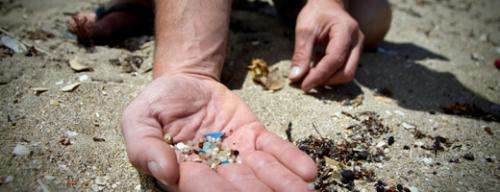Microplastic pollution confirmed to be a threat to marine biodiversity

New research confirms scientists' predictions that microplastic pollution could severely affect marine biodiversity and the health of our oceans
Back in 2010 Fauna & Flora International (FFI) identified that microplastics could pose an emerging threat to marine biodiversity and food chains. The presence of tiny particles of plastic (less than 5 mm) in the water column and in marine sediments seemed to be an accident waiting to happen – or in fact an accident that had already happened…
Research by scientists at the Universities of Exeter and Plymouth, as reported by the BBC this week, now confirms the risk that microplastics pose to marine biodiversity.
Microplastics arrive in the world's oceans directly – for example through the billions of plastic 'microbeads' washed down our sinks each year – and also indirectly, by the breakdown of large items of plastic that find their way into the ocean.
Previously conservationists had thought the main threat to biodiversity from plastics was from animals ingesting, or being entangled by, these larger plastic objects. However this new research now confirms the real and insidious nature of the threats arising from microplastic pollution.
A wide range of marine life has now been found to ingest microplastic particles – including mussels, worms, fish and even plankton (which underpins the whole marine food chain). Microplastics are also known to concentrate toxic pollutants which have previously been washed into our oceans – including DDT and PCBs – up to one million times background levels.
Current research findings demonstrate that the toxins bound to ingested microplastics are actually transferred into the animals that ingest them. The animals in question – lugworms – showed clear reactions to these toxins, and in some cases even died as a result. Another study has also been published, showing similar results in small fish, where ingestion of microplastics laden with toxins resulted in liver damage.
FFI is the first international, biodiversity conservation organisation to explicitly develop a programme around marine microplastics – although a range of ocean campaign groups has already raised this issue. Dr Abigail Entwistle, FFI's Director of Science commented, "We recognised that these plastic particles – and their ability to attract and concentrate toxins – would inevitably have some negative impacts on biodiversity. We are now saddened to have this belief confirmed."
In 2012 FFI started a programme of work on reducing the sources of microplastics into the seas, and earlier this year launched the Good Scrub Guide – a way of helping to consumers support this aim through their buying choices, and avoid using facial scrubs which add further plastic microbeads to the billions already polluting our oceans.
Provided by Fauna & Flora International




















